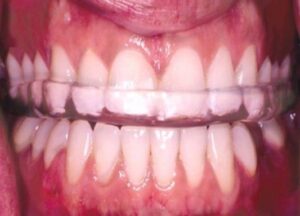Tips for Dealing with Teeth Grinding

Teeth grinding, also known as bruxism, is a common issue that affects both kids and adults. It can happen while you’re asleep or during the day, often due to stress, anxiety, or misaligned teeth. While it might seem harmless initially, it can lead to serious dental problems such as breakage of teeth and fillings, tooth wear and sensitivity. Luckily, there are effective ways to help manage and reduce teeth grinding. Here’s what you need to know.
Understand the Cause
Before looking for solutions, it’s essential to figure out why you’re grinding your teeth. Stress and anxiety are often the main reasons, but other factors like misaligned teeth or sleep disorders can also play a role. If you’re unsure, it’s a good idea to consult your dentist or doctor to pinpoint the cause so you can address it properly.
Orthodontic treatment
Orthodontic treatment can play a significant role in addressing teeth grinding especially when the underlying cause is related to dental misalignment. Braces, or other orthodontic appliances can help by gradually shifting teeth into proper alignment. This process not only improves the appearance of your smile but can also correct bite issues. A properly aligned bite distributes pressure more evenly across all teeth during chewing and at rest.
Managing Stress
Since stress is a common trigger for teeth grinding, finding ways to relax can be very helpful. Here are some techniques you can try:
- Relaxation Methods: Activities like breathing exercises, yoga, or meditation can help reduce stress levels.
- Stay Active: Regular physical exercise can alleviate tension and improve your mood.
- Better Sleep Habits: Create a soothing sleep environment by keeping your bedroom quiet and dark. Try to stick to a regular sleep schedule.
Consider an occlusal splint

One effective method to protect your teeth is to use an occlusal splint. Your dentist can create a custom one that fits your mouth, which you can wear at night. This device acts as a cushion between your teeth, preventing damage from grinding.
Explore Botox Treatments
A newer option for treating bruxism is Botox. In small amounts, Botox can be injected into the jaw muscles to relax them, reducing grinding and associated issues like headaches and jaw pain. This treatment typically lasts for several months before needing a repeat.
Small Lifestyle Changes
Making slight adjustments to your daily routine can also help:
- Avoid Chewing Gum: Excessive chewing can worsen grinding habits.
- Maintain Good Posture: Sitting up straight can help relieve tension in your jaw.
- Cut Back on Stimulants: Limit caffeine and alcohol, especially in the evening, as they can increase grinding.
Seek Professional Help
If teeth grinding continues to be a problem, consider visiting a dental professional or orthodontist who can offer specialized advice. Regular dental check-ups are essential, as your dentist can spot early signs of wear and help prevent further damage.
In summary, bruxism can impact your dental health, but with stress management techniques, protective occlusal splint, and professional guidance, you can tackle this issue effectively. By taking these steps, you’ll help protect your teeth and maintain a healthier mouth.
